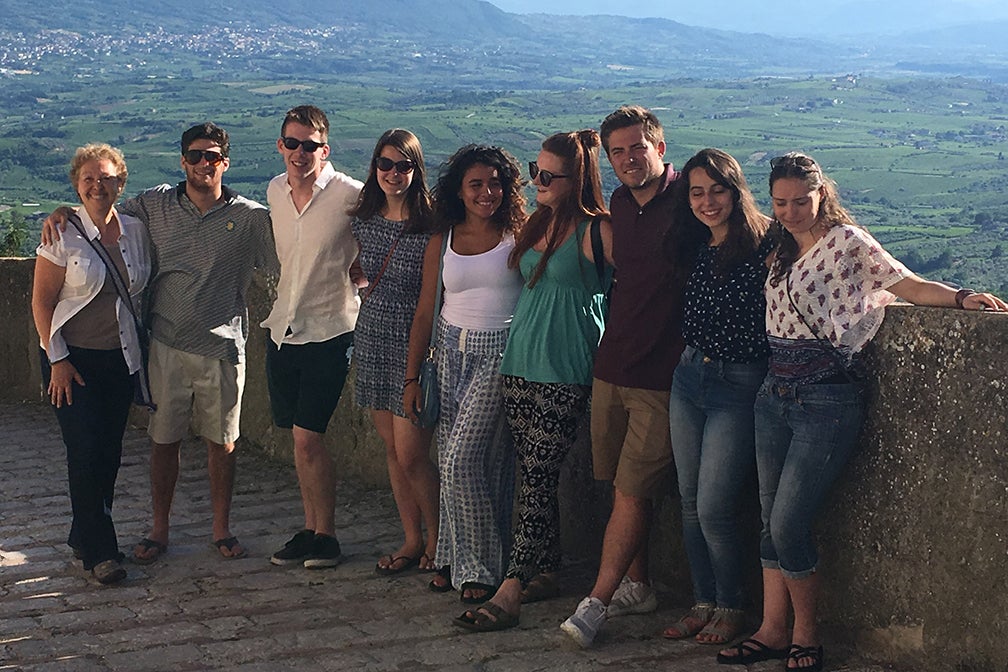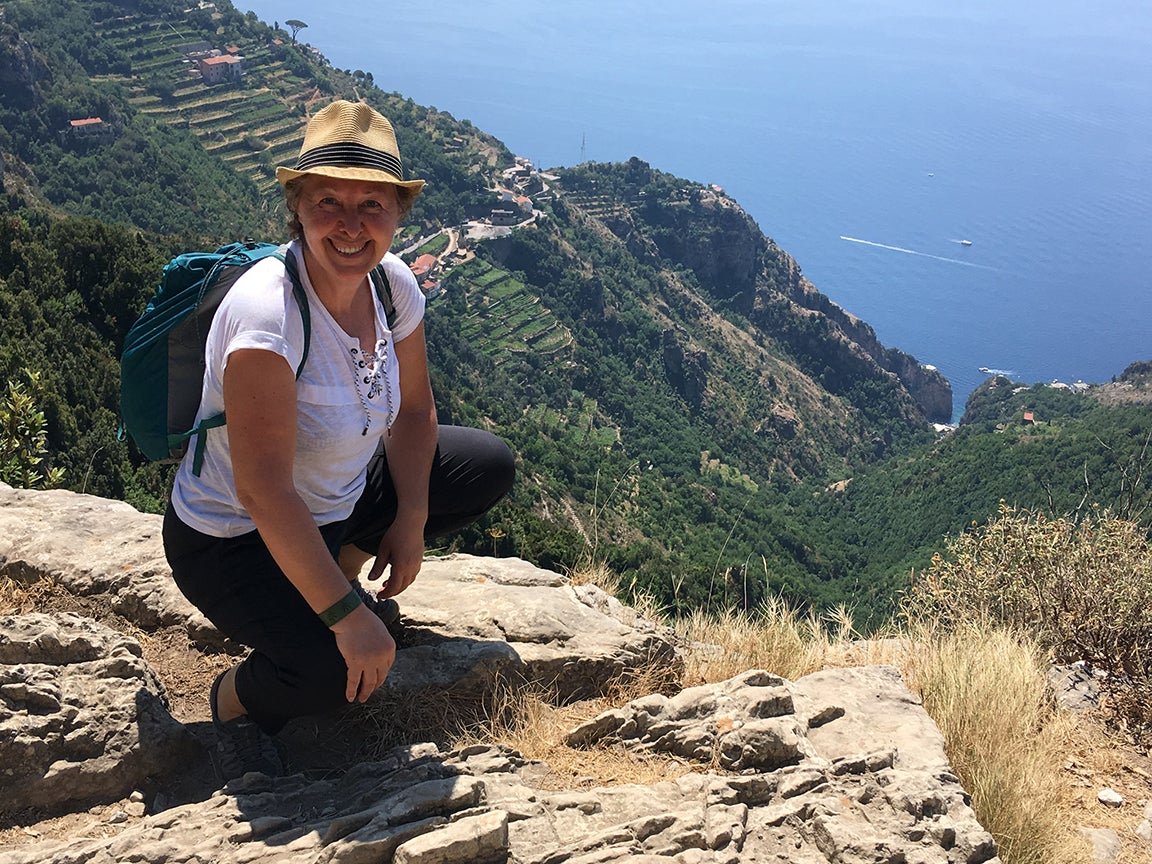KINGSTON, R.I. – June 2, 2021 – Rosaria Pisa, teaching professor of sociology and chair of the Department of Gender and Women’s Studies at the University of Rhode Island, has been awarded a Fulbright Scholar Award to research changes in rural communities and teach for six months in southern Italy.
From January to June 2022, Pisa will divide her time between studying gender and rural transformations in the Benevento province of Campania and teaching at The University of Naples, L’Orientale. She will be hosted by the Centre for Postcolonial and Gender Studies in the Department of Human and Social Sciences at the university.

“It’s an honor to receive a Fulbright Scholar Award. It is significant for me because it will give me the opportunity to return to my native country and city,” said Pisa. “It will permit me to teach and do research and give back to my native country. I will be able to share with students, colleagues, and locals what I have learned here at URI, all my experiences over my years outside of Italy, and most of all, be able to learn from them. It’s a dream come true.”
For the last 25 years, Pisa’s research has taken her to Mexico, Italy and around Rhode Island to explore such areas as agrarian land tenure systems and women’s and indigenous agrarian rights, and more recently, the gender dynamics of local and organic agriculture and changes to rural landscapes and cultures.
In the province of Benevento, Pisa will focus on the effects of rural transformations underway in rural-agrarian communities, exploring the areas of social integration of new social actors, gender dynamics, and racist attitudes and institutions among other forces that characterize the “new rurality” today. The region has experienced a rapid influx of newcomers who are engaging in agricultural work and enterprises – including young urbanites, women, LGBTQ people, and migrant farmworkers from Northern Africa. The communities most affected are very old, in some cases medieval, with families who have lived there for generations. At the same time, many of these communities are facing economic difficulties.
Some of these newcomers are being drawn to the region for agricultural entrepreneurship incentivized by the European Union and Italian rural development policies, in contrast with migrant workers, many of whom are unauthorized people of color, who are vulnerable to exploitation, racism, and postcolonial processes. Pisa will be looking at such issues as how the newcomers engage with and are incorporated into these communities, what support they have access to, what resources they bring to these communities, and how the communities are addressing sociocultural tensions.
“So, this dynamic is going on,” said Pisa, who will focus on the town of Guardia Sanframondi in Benevento. “There’s a struggle over economic resources, land and other natural resources, over who gets to belong to this new rural environment and who doesn’t or is marginalized.”
“What I am looking at are not just how rural-agricultural landscapes are changing,” she added. “It’s rural communities in transition and how they are adapting to all these policy interventions, and economic and cultural forces. Behind my interest is that I want to see these communities thrive. I am impressed with all the ways these communities are changing and revealing processes of adaptations, accommodation, and resistance.”
Pisa, who immigrated to the U.S. in 1971 at age 9, says her research interests have been shaped by her immigrant experience and her happy summers as a child in the then rural town of Cicciano outside of Naples, where she was born and where she found peace in contrast to city life in Milano, where she was raised.
“I’m very interested in the relation among land, culture, and identity formation,” said Pisa. “This interest is directly connected to my having been displaced from my land at a young age and the identity crisis that ensued. I realized at a young age that you form your ethnic identity or sense of self within a localized, material cultural context and when separated from that context, your identity is compromised and remains influx.
“I still live between and among cultural worlds after so many years. This moment or to be more exact, trauma, I experienced as a child sparked my interest in studying communities where land issues are central, where issues of ownership and belonging are culturally important. That is especially true for indigenous communities in Mexico that I researched earlier in my career, where there’s a direct connection between the land and cultural survival. The centrality of the land, the overall environment that make up your peoples’ history and present, is fundamental to the everyday practice and reproduction of your culture. These realities resonated for me, so much so that I transmit these ideas to students who accompany me to Mexico (Oaxaca) or Italy (Naples) on my faculty-led study abroad programs.”
Along with her research, Pisa will spend several months teaching a gender, agriculture and sustainability course at L’Orientale, discussing gender dynamics in the countryside and using her research in Mexico, Italy, and Rhode Island as case studies.
“The idea of teaching in Naples for me is incredible. My father, who went to the University of Naples, Federico II and spoke highly of L’Orientale, would have been very proud of me. Sadly he passed away two years ago,” she said. “The idea of giving back, of sharing what I have gained here in the United States and at URI is really significant. The opportunity to teach Italian students and students from other parts of the world will be thrilling.”
Since immigrating to the U.S., Pisa has visited Naples numerous times. In 2012, she created a study abroad program in Mexico, and started a similar program taking students to southern Italy a year later. Both programs study the interrelationships among environment, culture, agriculture and food systems. Combined, she has taken about 90 students to Mexico or Italy since the start of the programs.
With her Fulbright, she hopes to establish the groundwork for ongoing research that will include bringing students to assist her as an offshoot of the current study abroad program. She would also like to establish a collaborative agreement with the Centre of Postcolonial and Gender Studies that would include a scholar exchange program and the opportunity for URI students to study at L’Orientale.
“I’m very eager to establish a long, lasting relationship with my native city and country,” she said. “For me, the Fulbright to Italy is a dream come true and an opportunity to deepen my connection and work there, and importantly, support research opportunities for URI students and scholarly collaborations.”
The Fulbright Scholar Program is the flagship international educational exchange program sponsored by the U.S. government and is designed to increase mutual understanding between the people of the U.S. and the people of other countries. Recipients of Fulbright grants are selected on the basis of academic or professional achievement, as well as demonstrated leadership potential in their fields. Established in 1946, the program operates in more than 155 countries worldwide.

